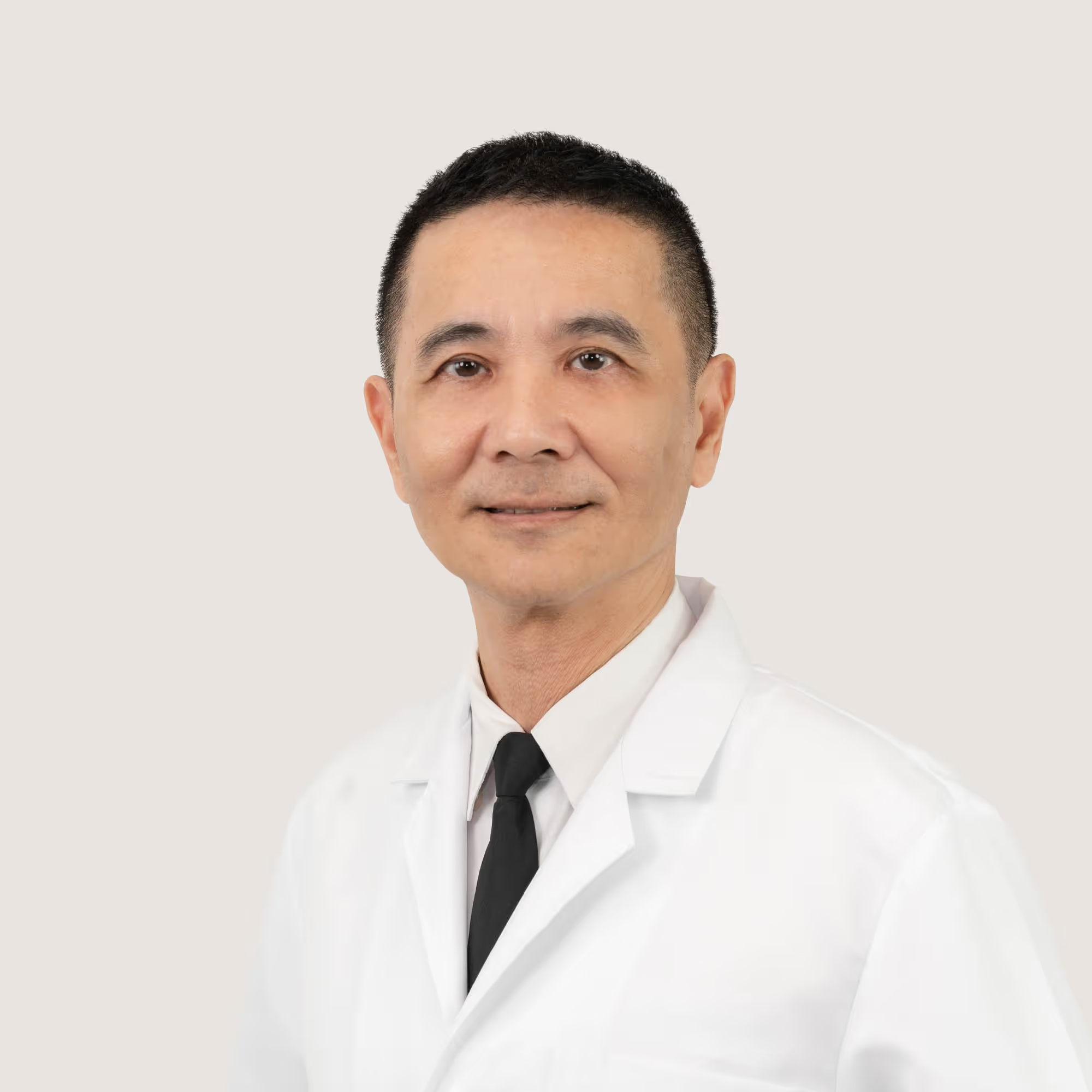ศูนย์อายุรศาสตร์โรคมะเร็ง และโลหิตวิทยา
“มะเร็ง” ถือเป็นสาเหตุของการเสียชีวิตอันดับหนึ่งของคนไทยและประชากรโลก ตามข้อมูลจากสถาบันมะเร็งแห่งชาติ ปี พ.ศ. 2565 พบว่า ในทุก ๆ ปี จะมีคนไทยเสียชีวิตด้วยโรคมะเร็งรายใหม่มากกว่า 140,000 คน หรือเฉลี่ยวันละ 400 คน และยังมีแนวโน้มของผู้ป่วยรายใหม่เพิ่มขึ้นอย่างต่อเนื่องทุกนาที
แม้ว่าโรคมะเร็งจะดูร้ายกาจและน่ากลัวสำหรับใครหลาย ๆ คน แต่ทุกวันนี้เทคโนโลยีและนวัตกรรมในการบำบัดรักษามะเร็งก็มีการพัฒนาอยู่ตลอดเวลา เพื่อช่วยให้คนไข้มีโอกาสหายขาด หรือบรรเทาความเจ็บปวดจากตัวโรคให้ทุเลาเบาลง โดยแนวทางการรักษามะเร็งมีหลายรูปแบบ แต่ 80 - 90% รักษาด้วยการใช้ยาเคมีบำบัด นอกจากนี้ยังมีแนวทางการรักษาแบบประคับประคองสำหรับคนไข้มะเร็งระยะสุดท้ายด้วย ในเมื่อสิ่งที่คนไข้มะเร็งกลัวที่สุดไม่ใช่ “โรคมะเร็ง” แต่เป็น “การรักษามะเร็ง” เป้าหมายสูงสุดของศูนย์อายุรศาสตร์โรคมะเร็งและโลหิตวิทยา คือ การดูแลรักษาให้คนไข้มีสุขภาพดี และช่วยให้คนไข้มีคุณภาพชีวิตที่ดีขึ้น
ทำไมต้องศูนย์อายุรศาสตร์โรคมะเร็งและโลหิตวิทยา ที่เมดพาร์ค
- ดูแลคนไข้แบบองค์รวมด้วยทีมแพทย์และบุคลากรผู้ชำนาญการเฉพาะทางด้านมะเร็ง พร้อมด้วยเครื่องมือและเทคโนโลยีที่มีการอัปเดตใหม่ตลอดเวลา ให้การดูแลรักษาทั้งร่างกายและสภาพจิตใจ ด้วยความเข้าอกเข้าใจอย่างเต็มที่ ใส่ใจทุกความกังวล ให้คำแนะนำอย่างอบอุ่นเหมือนสมาชิกครอบครัว
- บำบัดรักษาโรคมะเร็งทุกชนิด โดยเฉพาะโรคมะเร็งที่พบบ่อยในคนไทย คือ มะเร็งตับและท่อน้ำดี มะเร็งปอด มะเร็งเต้านม มะเร็งปากมดลูก มะเร็งลำไส้ใหญ่และทวารหนัก และมะเร็งต่อมลูกหมาก ด้วยเทคนิคที่ดีต่อคนไข้มากที่สุด โดยมีเป้าหมายสำคัญในการหยุดการเจริญเติบโตของเซลล์มะเร็ง ลดความเจ็บปวด ช่วยให้คนไข้และญาติเกิดความรู้สึกอุ่นใจ มีกำลังใจในการรักษาจนจบกระบวนการ จวบจนสามารถฟื้นฟูให้กลับมามีสุขภาพดี และมีคุณภาพชีวิตที่ดี
- ปรับสูตรยาเคมีบำบัดให้สอดคล้องกับคนไข้และตัวโรคให้มากที่สุด ด้วยเครื่องผสมยาเคมีบำบัด (Cytotoxic Admixture) เพื่อให้สูตรยาแต่ละตัวมีความแม่นยำและเหมาะสม ออกฤทธิ์ยับยั้งการเติบโตของเซลล์มะเร็งได้ดี การมีเครื่องผสมยาจึงช่วยให้สามารถจัดสัดส่วนของยาเคมีบำบัดได้ถูกต้อง มีความสะอาดตามมาตรฐานสากล รวมทั้งยังช่วยลดความเสี่ยงในการสัมผัสและสูดดมตัวยาเคมีของเภสัชกรซึ่งทำหน้าที่ผสมยาในแต่ละครั้ง
- ให้บริการห้องให้ยาส่วนตัว เป็นห้องเดี่ยวที่ออกแบบให้มีความเป็นส่วนตัวสูง คนไข้สามารถรับคำปรึกษาจากแพทย์ได้โดยไม่ต้องกังวลว่าผู้อื่นจะได้ยิน ขณะเดียวกันก็ยังอยู่ในสายตาของพยาบาลวิชาชีพเฉพาะทางซึ่งมีความชำนาญในการดูแลคนไข้ระหว่างรักษาด้วยการให้ยา คอยสังเกตความผิดปกติและอาการแทรกซ้อนอยู่บริเวณเคาน์เตอร์พยาบาลด้านนอก ภายในห้องให้ยามีการติดตั้งอุปกรณ์ช่วยเหลือกรณีเกิดเหตุฉุกเฉินครบถ้วน มีแพทย์ผู้ชำนาญการคอยดูแลตลอดทั้งวัน จึงมีความปลอดภัยสูง
- ติดตามอาการหลังการรักษา ด้วยการโทรสอบถามอาการภายหลังให้ยาทั้งชนิดฉีดเข้าเส้นเลือดดำและชนิดกลับไปรับประทานเองที่บ้าน รวมทั้งยังมีการสื่อสารผ่าน Line Official ของศูนย์เพื่อพูดคุยติดตามอาการ ช่วยคลายความกังวลของคนไข้เมื่อพบอาการผิดปกติขณะอยู่บ้านและต้องการคำปรึกษาจากบุคลากรทางการแพทย์ รวมทั้งยังมีการนัดตรวจติดตามหลังจบการรักษา เพื่อติดตามการกลับมาเป็นซ้ำของโรคตามระยะเวลาที่แพทย์แนะนำ
โรคและภาวะผิดปกติ
- มะเร็งเยื่อบุ (Carcinoma) ได้แก่ มะเร็งเต้านม มะเร็งต่อมลูกหมาก มะเร็งปอด มะเร็งลำไส้ มะเร็งผิวหนัง มะเร็งเยื่อบุปอด มะเร็งช่องปาก มะเร็งลำคอ มะเร็งกระเพาะอาหาร มะเร็งกระเพาะปัสสาวะ เป็นต้น
- มะเร็งซาร์โคมา (Sacoma) เช่น มะเร็งกระดูก เป็นต้น
- มะเร็งเม็ดเลือดขาว (Leukemia) เช่น มะเร็งเม็ดเลือดขาวเฉียบพลัน มะเร็งเม็ดเลือดขาวเรื้อรัง มะเร็งเม็ดเลือดขาวจากต่อมน้ำเหลือง เป็นต้น
- มะเร็งต่อมน้ำเหลือง (Lymphoma) เช่น มะเร็งต่อมน้ำเหลืองฮอดจ์กิน (Hodgkin lymphoma) และ มะเร็งต่อมน้ำเหลืองชนิดนอนฮอดจ์กิน (Non-Hodgkin lymphoma) เป็นต้น
- เนื้องอกชนิดอื่น ๆ เช่น มะเร็งผิวหนังเมลาโนมา เนื้องอกในสมองและไขสันหลัง เนื้องอกเซลล์สืบพันธุ์ชนิดเจิมเซลล์ เนื้องอกเน็ต (NETs) เป็นต้น
บริการตรวจวินิจฉัยและหัตถการ
- ตรวจคัดกรองโรคมะเร็งทุกชนิด โดยเฉพาะมะเร็งกลุ่มที่องค์การอนามัยโลก (WHO) แนะนำให้ตรวจคัดกรองเป็นประจำ ได้แก่ มะเร็งปากมดลูก มะเร็งเต้านม มะเร็งลำไส้ ซึ่งช่วยลดอัตราการเกิดโรคหรือเสียชีวิตจากโรคมะเร็งได้ดี หากพบไวก็สามารถวางแผนรักษาตามความเหมาะสมได้เร็วขึ้น และมีโอกาสหายเป็นปกติมากขึ้น
- ตรวจคัดกรองโรคมะเร็งสำหรับกลุ่มเสี่ยง (Cancer Screening) เช่น สมาชิกในครอบครัวมีประวัติป่วยด้วยโรคมะเร็ง เพื่อให้สามารถวินิจฉัยและรักษาโรคมะเร็งนั้น ๆ ได้ทันท่วงที
- ให้คำปรึกษาระหว่างการรักษาไปจนจบการรักษา (Cancer Counselling) เช่น วางแนวทางการรักษาแบบองค์รวม ดูแลสุขภาพเพื่อลดอาการข้างเคียงระหว่างการรักษาโรคมะเร็ง และหลังจบกระบวนการรักษา เพื่อให้คนไข้ได้รับการดูแลอย่างใกล้ชิด ติดตามสัญญาณความผิดปกติหลังการให้ยา ช่วยให้สามารถรับมือได้ทันท่วงที มีการให้คำปรึกษาร่วมกับนักจิตวิทยา เพื่อช่วยให้คนไข้และญาติรู้สึกปลอดภัย อุ่นใจ และมีกำลังใจในการรักษาต่อไป
- รักษาโรคมะเร็งทุกชนิดโดยการใช้ยา ได้แก่ การรักษาด้วยยาเคมีบำบัด (Chemotherapy) การรักษาแบบมุ่งเป้า (Targeted Therapy) การรักษาแบบภูมิคุ้มกันบำบัด (Immunotherapy)
- การรักษาโรคมะเร็งด้วยยาต้านฮอร์โมน (Hormonal Therapy) เป็นการยับยั้งในฮอร์โมนร่างกายที่มีผลต่อการเจริญเติบโตของก้อนมะเร็ง ช่วยหยุดพัฒนาการของมะเร็งได้อย่างมีประสิทธิภาพ
- การรักษาแบบผสมผสาน และการจัดการความเจ็บปวด เป็นการรักษาเพื่อจัดการกับความเจ็บปวดที่เกิดขึ้น เพื่อให้คนไข้รู้สึกผ่อนคลาย และใช้ชีวิตประจำวันได้อย่างมีคุณภาพมากขึ้น
ความชำนาญพิเศษ
มะเร็งเป็นโรคที่รักษายากและมีโอกาสกลับมาเป็นซ้ำได้อีก จึงต้องการการดูแลรักษาอย่างใกล้ชิดโดยแพทย์เฉพาะทางด้านการรักษามะเร็งที่มีประสบการณ์สูง เข้าใจความรู้สึกของคนไข้ และให้ความสำคัญในการค้นหารูปแบบและแนวทางรักษาที่ช่วยให้คนไข้มีคุณภาพชีวิตที่ดีขึ้นมากที่สุด
- รักษามะเร็งที่ดื้อยา เป็นการตรวจระดับยีนเพื่อหาวิธีรักษาที่ดีที่สุด ช่วยป้องกันและรับมือการดื้อยาที่อาจเป็นอุปสรรคในการรักษา ช่วยให้คนไข้ได้รับการรักษาตรงจุดมากขึ้น ลดความยืดเยื้อจากการปรับเปลี่ยนแนวทางรักษาบ่อย ๆ ซึ่งมีผลต่อสุขภาพและกำลังใจในระยะยาว
- รักษาโรคมะเร็งด้วยยาเคมีบำบัด (Chemotherapy) ช่วยยับยั้งการเจริญเติบโตของเซลล์มะเร็งที่แบ่งตัวเร็ว แม้ว่ายาแต่ละสูตรจะมีผลข้างเคียงชั่วคราว เช่น คลื่นไส้ อ่อนเพลีย ท้องเสีย ผมร่วง แต่แพทย์จะมีการคำนวณสูตรยาที่เหมาะสมทั้งปริมาณ ระยะเวลา รวมถึงให้ยาเสริมเพื่อลดความรุนแรงของอาการข้างเคียง เช่น ยาแก้อาเจียน ยาแก้แพ้ ยาแก้ท้องเสีย จึงช่วยให้คนไข้ได้รับการรักษาอย่างมีประสิทธิภาพ ควบคู่ไปกับการดูแลสุขภาพกายและจิตใจไปพร้อม ๆ กัน
- รักษาโรคมะเร็งด้วยฮอร์โมน (Hormonal Therapy) เหมาะสำหรับมะเร็งชนิดที่โตขึ้นจากการหล่อเลี้ยงของฮอร์โมนภายในร่างกาย เช่น มะเร็งเต้านม มะเร็งต่อมลูกหมาก แพทย์จะให้ยาต้านฮอร์โมนเพื่อไปยับยั้งการเจริญเติบโตของก้อนมะเร็ง ช่วยให้มะเร็งหยุดการแพร่กระจาย ซึ่งให้ผลลัพธ์การรักษาที่ดี ทั้งยังมีผลข้างเคียงน้อยกว่าการรักษาด้วยยาเคมีบำบัด
- รักษาแบบภูมิคุ้มกันบำบัด (Immunotherapy) เป็นการอาศัยกลไกกำจัดสิ่งแปลกปลอมในร่างกายของระบบภูมิคุ้มกัน โดยยาจะเข้าไปเพิ่มประสิทธิภาพของเม็ดเลือดขาวในการตรวจจับสิ่งผิดปกติอย่างเซลล์มะเร็ง และเข้าไปทำลายได้สำเร็จ การรักษาแนวทางนี้มีผลข้างเคียงน้อยกว่ายาเคมีบำบัด หากรักษาตั้งแต่ระยะแรก ๆ ก็มีโอกาสหายขาด ช่วยให้คนไข้มีคุณภาพชีวิตที่ดีขึ้น
- รักษาแบบมุ่งเป้า (Targeted Therapy) ตัวยาจะเข้าไปลดการแบ่งตัวของเซลล์มะเร็ง รวมทั้งลดการสร้างเส้นเลือดใหม่ ๆ ที่เข้ามาเลี้ยงเซลล์มะเร็ง ช่วยให้ยับยั้งการเพิ่มจำนวนของเซลล์มะเร็งได้อย่างมีประสิทธิภาพ แนวทางนี้เป็นการออกฤทธิ์เฉพาะเจาะจงกับเซลล์มะเร็งเท่านั้น จึงมีผลข้างเคียงน้อยกว่ายาเคมีบำบัด ทั้งนี้ขึ้นอยู่กับความรุนแรงของโรค และแตกต่างกันไปในแต่ละบุคคล ซึ่งแพทย์และพยาบาลจะให้การดูแลอย่างใกล้ชิดตลอดการรักษา
- ดูแลคนไข้มะเร็งระยะสุดท้ายแบบประคับประคอง (Palliative Care) เน้นดูแลสุขภาพจิตใจ อารมณ์ วางแผนความต้องการในช่วงสุดท้ายของชีวิต (The living will) ร่วมกับนักจิตวิทยา และช่วยจัดการความเจ็บปวดโดยวิสัญญีแพทย์เฉพาะทางด้านการระงับปวด เพื่อให้คนไข้มีคุณภาพชีวิตที่ดีที่สุดเท่าที่ทำได้ และญาติสามารถยอมรับการจากไปได้อย่างสงบ ไม่เศร้าโศกเสียใจกับการสูญเสียจนนำไปสู่ภาวะที่เป็นอุปสรรคต่อการใช้ชีวิตต่อไปในอนาคต







